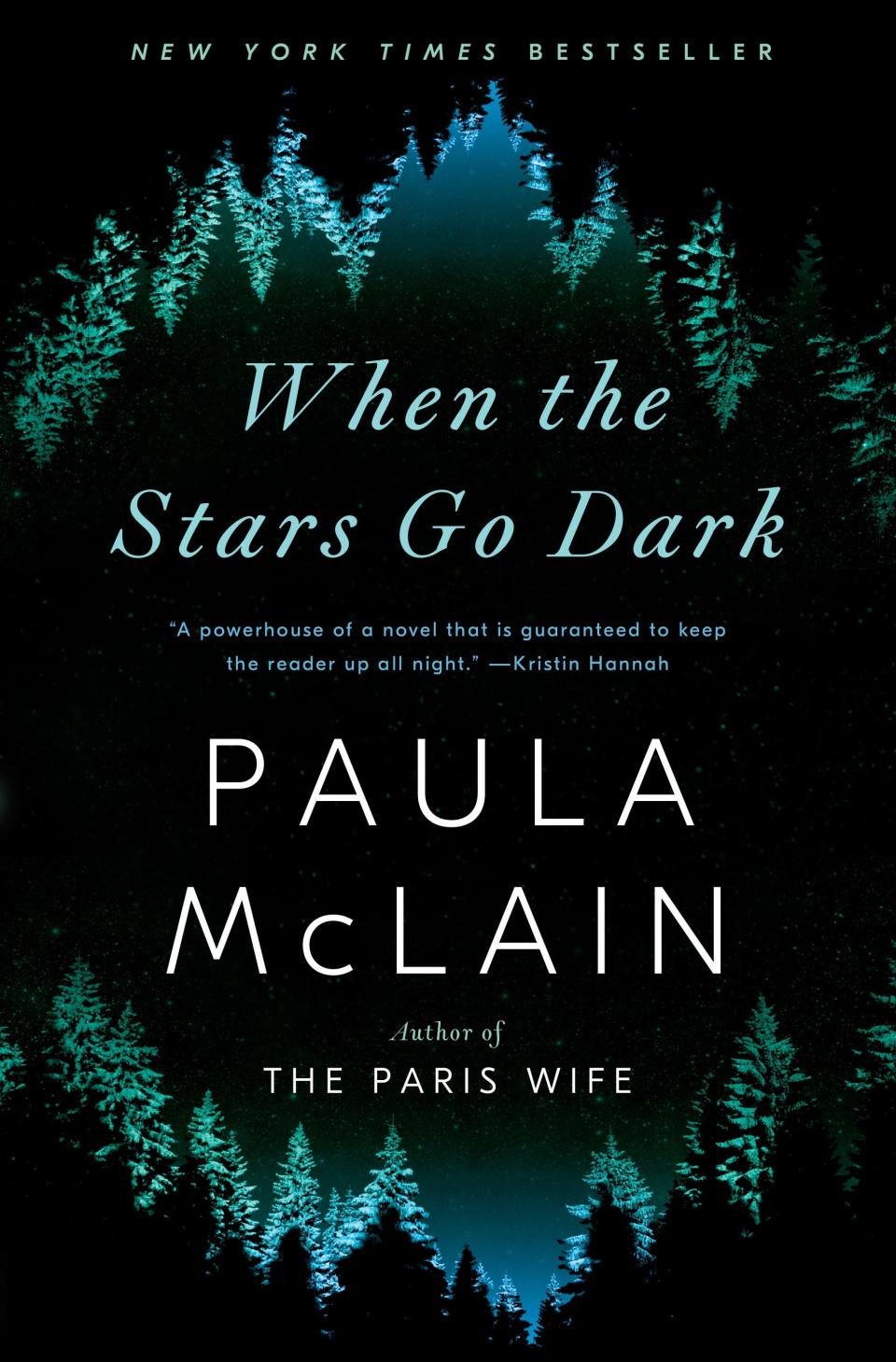Author McLain explores trauma, betrayal in novels set throughout time
- Oops!Something went wrong.Please try again later.

For her newest novel, author Paula McLain didn’t just leap from one genre to another — she leapt through time.
The author of “Circling the Sun,” “The Paris Wife” and “Love and Ruin,” all historical fiction novels, released her first thriller in 2021 with “When the Stars Go Dark.” Weaving through each of her novels are themes of betrayal, trauma and, ultimately, a form of redemption.
“I’m very interested in trauma and trauma theory,” McLain said. “What is it that gets in? What do we carry, and how does what we carry get communicated without words to people who would do harm to us? That’s interesting to me.”
McLain is the keynote speaker at the Love of Literacy Luncheon benefiting the Literacy Coalition of Palm Beach County, from 11:30 a.m. to 1:30 p.m. Thursday at the Kravis Center in West Palm Beach.
Related: Golf tournament aids Literacy Coalition
She explores the darker side of human consciousness through her writing, an outlet she has turned to since youth as she grappled with trauma herself. After their mother and then their father abandoned them, McLain and her two sisters entered the foster care system, an experience that inspired McLain’s first book, the memoir, “Like Family: Growing Up in Other People's Houses.”
While McLain wrote throughout her youth, that was done for herself and she never shared her writing with anyone, she said. She didn’t take a creative writing class until she was 24 and working in a nursing home to put herself through school.
That began her journey with poetry, which she reflected on as “just beautiful. It has no practical use,” she said. “It just reminds us of why we’re human.”
The experience was extraordinary, she said. She took another class, and another, and her teachers continued to encourage her to consider writing as a career.
“I had no idea that you could just be a writer,” McLain said. “You could study writing the way you study geology. You could learn it like a craft.”
As she worked on her poetry — she released her first collection of poems in 1999 — her classmates encouraged her to tell her story of growing up in foster care as a memoir.
“Those people still populated my dreams and my thoughts,” McLain said. “They took up rent and I had the idea that I could work with them maybe, even as a way to make sense of what had happened to me.”
While her poetry was written from an autobiographical place, McLain said she hid behind her language. With a memoir, it was an opportunity to “tell the story straight,” she said.
“These are the people who, for better or for worse, brought me up,” McLain said.
Hemingway ‘didn’t go away’
In the 20 years since her memoir was published, McLain achieved major success with “The Paris Wife,” a historical fiction novel told from the perspective of Ernest Hemingway’s first wife. The novel explores their love and betrayal, with incredible attention paid to the real-life details of their lives in Paris.
She returned to explore Hemingway’s love life with “Love and Ruin,” an examination of Hemingway’s marriage to famed war correspondent and writer Martha Gellhorn.
McLain said she never planned to write about Hemingway again, but something called to her.
“I was done with him,” she said. “I’m a novelist. I’m not a Hemingway scholar. It was just a story that struck me and I wanted to go on to other stories. But he didn’t go away.”
The idea came to her in a dream, she said: She was fishing on Hemingway’s boat, “Pilar,” with him, and there was a woman with them. The woman was marlin fishing, and she put a piece of bait into a fish’s mouth, then turned around to reveal that it was Gellhorn.
“I thought, ‘What the hell?’” McLain said. “It was just bizarre to have a dream like that. … I pay attention to things like that, like, ‘What’s that dream trying to tell me?’”
It was exciting, McLain said, to step back into a position where she could write about a fearless woman, after writing about Beryl Markham — the first person to fly a non-stop solo trip across the Atlantic from Great Britain to North America — in “Circling the Sun.”
Read more: 'The Story of Arthur Truluv' is pick for Read Together Palm Beach County
“There’s just something super liberating about telling a story about a woman who acts with courage, acts fearlessly and takes big risks. And suffers, of course, too.”
Her research for “The Paris Wife” and “Love and Ruin” took her around the world, from the house in Cuba where Hemingway lived for 20 years until he had to leave during the Cold War, to his property in Sun Valley, Idaho, where he ultimately took his own life.
“I think the reason he’s so fascinating is because you can’t really pin him down,” McLain said. “He was many, many different things.”
On writing a thriller

Her writing life has been a story of transitions: From poetry to narrative, from memoir to historical fiction, and now from historical fiction to thriller.
“Ideas are stardust,” McLain said. “They come and they go, and I have ideas all the time that I don’t follow up on.”
When she first conceived the idea of a woman who investigated missing-persons cases, McLain was walking her dog during a break from working on “Love and Ruin.” As she walked, the character developed more and more: “She’d be a wounded healer type. She’d have desperate circumstances behind her, but she’d be trying to find purpose in the things that have caused her pain,” McLain said. “She’d be interested in victims rather than predators, and for really good reasons.”
She continued her walk and assumed the idea would go away — but it didn’t. After finishing “Love and Ruin,” she went to lunch with her agent and decided she would tell her about the idea for the thriller. “I was going to tell her this and she’s going to tell me that I’m bananas,” McLain said. “But she didn’t tell me that. She said, ‘My god, that sounds amazing. I think you should do it.’ So I did.”
The research she did for “When the Stars Go Dark” differed from her work in historical fiction, she said. With her three previous novels, she built stories around historical facts on record.
“It was the first time in 12 years, literally, that I was writing about fictional characters, that the plot was up to me,” McLain said.
The experience was liberating and terrifying, knowing anything could happen, she said.
She tapped into a new resource: “a living, breathing missing-persons detective, a woman,” McLain said. It was her first time interviewing someone for that level of research.
“She gave me funny details,” McLain said of the detective. “Like when you go to someone’s house to interview them, you would never, ever take off your shoes.”
The detective also explained to McLain more disturbing aspects of her job, like what happens when finding a body that has been in a trunk.
The detective also shared with McLain some of the more psychological aspects of the job, telling McLain that female detectives compartmentalize at crime scenes better than their male counterparts. “The women carry it deeper,” McLain said.
As part of her research, McLain read a lot of true crime — a task she did not relish. “It was really challenging,” she said. “There was a lot of violence in my childhood, a lot of domestic abuse, alcoholism, drug abuse.”
Reading stories of people on the edge brought that all back home.
The background of the main character, detective Anna Hart, is based on McLain’s past. She also shared some of her personality with Hart: “Her determination to heal, and this idea that if we heal ourselves, then we’re more likely not to cause harm to others,” McLain said. “And she means to try to make her peace with it, as difficult as that is. I think that is what we’re here to do.”
The book isn’t without some historical context. It’s set in 1993, an intentional step by McLain to force her characters to rely on their gut and instinct instead of the internet.
The book is set in northern California, and when McLain began to research 1993 California, she found a crime that had been in the headlines: the murder of Polly Klaas, a 12-year-old girl who was kidnapped by a stranger from her home during a slumber party and later strangled to death.
“They would be contemporary,” McLain said of the action in her novel and the investigation into Polly Klaas’ disappearance and death. “There would be no way that Anne wouldn’t be aware of that disappearance.”
The addition of the real case to “When the Stars Go Dark” added another layer of empathy, McLain said.
“It just put me in a completely different headspace and emotional space, and then the book started to feel like a sacred conversation with suffering, much the way that writing about real women’s lives feels like a feminist act and a humanist act,” she said. “
Writing about characters facing traumatic experiences and working through past trauma has served as a sort of therapy for McLain.
“But then if I hadn’t done so much therapy, I’m not sure that I could have written Anna the way that I have,” she said. “I wanted to give her the healing that I’ve glimpsed through the work that I’ve done, again, to tell a story that might inspire other people to have compassion for themselves, for family members they might not have understood, to think differently maybe about victims.”
‘Continuing education’
From early in her writing career, McLain has challenged herself to take on new and different projects as a way to keep what she called her “beginner’s mindset.”
“I need to throw myself off these cliffs as a way to keep learning,” McLain said. “I think I have managed to stay mostly in a place where I want to be a student, writing and looking for teachers everywhere.”
A cliff loomed as she contemplated writing “When the Stars Go Dark,” but McLain saw in the jump a chance to once again try something new.
“I think there’s more to gain when we risk more,” she said. “There are writers who are completely happy to write just, ‘The Next Someone Famous’ Wife,’” McLain noted, but she wants to maintain her inspiration and her passion for her work, to stay excited.
“I didn’t want to become a caricature of my own making,” she said.
With each new jump comes new knowledge and new challenges, McLain said. She considers it “continuing education.”
“What am I learning about? What can I still learn about Paris? What can I still learn about setting? What can I still learn about dialogue?” she said.
She’s putting her inquisitive nature to work with her latest novel, which she called “historical fiction plus.” The setting has once more returned to Paris, McLain said.
“I’m working like a crazy person, but it’s exciting for me,” she said.
If you go
What: Love of Literacy Luncheon
Where: Kravis Center, 701 Okeechobee Blvd., West Palm Beach
When: 11:30 a.m. to 1:30 p.m. Thursday
Info: Tickets are almost sold out. Go to www.literacypbc.org.
This article originally appeared on Palm Beach Daily News: Paula McClain discusses influences on her writing in advance of Love of Literacy lunch

